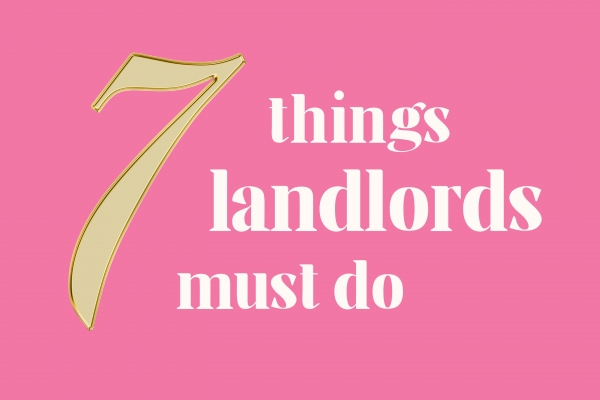This last year has seen over 40 changes to lettings legislation, enough to confuse even the most experienced letting agent, let alone a landlord of one or two properties.
With this in mind we are providing this update on the Coronavirus Act 2020 and the most important changes you should be aware of as a landlord.
Our thanks go to the Tenancy Deposit Service and PainSmith Solicitors for their assistance with writing this update.
If you would like any further information please get in touch!
Coronavirus Act 2020
This is temporary legislation and it will last until 31st May 2021 (at least). It affects notice periods between 26th March and 29th August 2020 with the exception of the most serious cases, landlords are not able to start possession proceedings unless they have given their tenants 6 months’ notice. These serious cases include those in relation to anti-social behaviour (including rioting), certain cases of domestic abuse in the social sector, false statement, where a tenant has accrued rent arrears to the value of over 6 months’ rent, where a tenant has passed away and where a tenant doesn’t have the right to rent under immigration legislation.
The stay on possession proceedings expired on 20th September 2020 and landlords are now able to progress their possession claim through the courts. Courts will carefully prioritise the most egregious cases, such as those involving anti-social behaviour and other crimes.
Legislation is in place to ensure bailiffs do not serve eviction notices or carry out evictions (including mortgage repossessions) but there are exemptions for the most serious circumstances that present the most strain on landlords. These circumstances are illegal occupation, false statement, anti-social behaviour, perpetrators of domestic abuse in the social rented sector, where a property is unoccupied following death of a tenant and serious rent arrears greater than 6 months’ rent. These measures are in force until the end of 31 May. Given that 14 days’ notice is required before an eviction can take place, no evictions are expected before mid-June except in the most serious circumstances.
Landlords are advised to check the current notice period, as and when required, it is likely to be a fazed return to normal. Multiple notices can be served, as and when the specific criteria is met. This legislation affects all tenancies under the Housing Act but not common law or company tenancies.
Serving Section 21 Notices
As of 1 June 2021 a 4 month notice period applies and Landlords should use the updated form 6a.
- All Deregulation Act requirements still applicable
From 29 August 2020, a Section 21 notice must give tenants at least 6 months’ notice of the fact that the landlord requires possession. Where a landlord gives a tenant a valid Section 21 notice after 29 August 2020, the notice will now remain valid for an extended period:
- 10 months from the date it is given to the tenant, where Section 21(4D) applies; or
- 4 months from the date specified in the notice as the date after which possession is required, if Section 21(4E) applies.
Serving Section 8 Notices
As of 1 June 2021 a 4 month notice period applies and you should use updated form 3.
There are some exceptions to this notice period:
- The tenant is at least 6 months in arrears
- There is anti-social behaviour
- The landlord has been induced into entering a tenancy that they would not have otherwise (ie. false information provided)
Mandatory Grounds
Mandatory Grounds are those under which a judge must award possession:
• Ground 1 – The landlord or their spouse requires possession as they used to occupy the property as their principle home and now wishes to re-occupy the property as their main home
• Ground 2 – The property is subject to a mortgage and the mortgagee is now entitled to exercise a power of sale on the property. The mortgage must have been taken out prior to the start of the tenancy and the tenant warned of this fact within their tenancy agreement
• Ground 3 – The tenancy is a fixed term of not more than 8 months and the property was previously a holiday let and is now to return to a holiday let
• Ground 4 – The tenancy is a fixed term of not more than 12 months and the property is student accommodation owned by an educational institution
• Ground 5 – The property is that of a minister of religion and is owned by a religious body
• Ground 6 – The property requires redevelopment or where the landlord wishes to demolish or substantially reconstruct the building
• Ground 7 – The tenant has died. Cannot be used against a surviving spouse.
• Ground 8 – The tenant is in rent arrears of more than 2 months if the rent is paid monthly (or 8 weeks if the rent is paid weekly or fortnightly or quarterly - if paid quarterly, or annually)
Discretionary Grounds
Discretionary grounds are those under which it is up to the judge as to whether they award possession:
- Ground 9 – Suitable accommodation has been offered on a like for like basis
- Ground 10 – There are some rent arrears - usually used in conjunction with Ground 8 above
- Ground 11 – Persistently late rent payments - usually used in conjuncton with Ground 8 above
- Ground 12 – Tenant in breach of contract
- Ground 13 – Tenant has neglected the property or there is damage to the accommodation or common parts
- Ground 14 – The tenant, lodger, sub-tenants or guests of the tenant are causing a breach of the peace, nuisance to neighbours or using the property for illegal or immoral purposes. Also covers domestic abuse.
- Ground 15 – The tenant has mis-treated the landlords furniture or furnishings
- Ground 16 – The tenant was previously employed by the landlord and the property was provided as part of the employment.
- Ground 17 – The tenant knowingly made false statement (lied) about their situation in order to gain the tenancy
Possession Proceedings
Following the reopening of the courts on 21st September 2020, new arrangements have been put in place to ensure that all parties have access to justice and the appropriate support.
Court rules are currently in force which require landlords who are making a possession claim to set out any information they are aware of about how their tenant, or any dependant of their tenant, has been affected by the coronavirus pandemic. Where the claim relates to rent arrears, landlords will also need to provide an updated rent account for the previous two years in advance of the hearing. Where any of this information is not provided, judges can adjourn proceedings until the requirement to provide it has been met.
Where a landlord is seeking possession as a result of suffering financial difficulty due to the pandemic, the landlord can draw that to the court’s attention by marking the claim ‘COVID-19’. Likewise, tenants who are challenging a possession claim can inform the court of how they have been impacted by the pandemic, marking their challenge ‘COVID-19’. Information supporting the ‘COVID-19’ marking must be provided.
If a landlord made a possession claim to the court before 3 August 2020, they are required to notify the Court and their tenant that they still intend to seek repossession before the case will proceed, including in section 21 cases. A reactivation form is available to support landlords doing this. Landlords have until 30 April to reactivated any claims pre-dating 3 August 2020.
The judiciary are prioritising the most serious cases for action. As a guide, priority will be given to claims issued before the stay commenced in March 2020, and to cases involving anti-social behaviour, extreme rent arrears, domestic abuse, fraud and deception, illegal occupiers and squatters or abandonment of a property, unlawful subletting, and cases concerning what was allocated as temporary accommodation by an authority.
A new review stage has been introduced. The review will take place at least 28 days before the substantive hearing and will enable tenants to access free legal advice through a duty solicitor. The court will send both landlord and tenant details of the review date and provide details of how the tenant can book an appointment with a duty solicitor.
A new mediation pilot integrated into the court process is supporting landlords and renters who face court procedures and potential eviction to resolve issues without the need for a formal hearing.
Evictions
UPDATE: The eviction ban has now been lifted as at 1 June 2021
The Public Health (Coronavirus) (Protection from Eviction) (England) (No.2) Regulations 2021 cannot take place until at least 31st May 2021.
No evictions unless:
• Possession orders made against trespassers;
• Possession orders made wholly or partly on the basis of anti-social behaviour;
• Possession orders made wholly or partly on the basis of a false statement;
• Possession orders made wholly or partly on the basis of domestic violence;
• Where the property is unoccupied following the death of a tenant;
• Where the order is made due to substantial rent arrears (6 months rent or more).
Lockdown Property Access
Landlords are advised as much as possible to continue with 'business as usual'.
Suggested reasonable adjustments are:
- Virtual viewings
- Less regular inspections
- Make sure you inform your tenant of the procedure for inspections
- Reasonableness of entry refusal – what is access required for? Repairs? Safety Checks? Viewings?
- Where the order is made due to substantial rent arrears (6 months rent or more).
Safety Requirements
Access restrictions DO NOT affect safety rules of deadlines!
- The tenant refusing access may not be enough to protect the Landlords from failures to comply with safety measures - ensure you document all correspondence
- EICR requirements mandatory for all applicable tenancies by 1st April 2021 so Covid is not an excuse to fail to comply with this electrical legislation
- If access is refused depending on reasons and importance – you may need to escalate, emphasise the importance to tenants and if necessary, serve notice
Special Offer for New Landlords
If the change in legislation is getting too much for you to keep up to date with, or if you are currently using another agency to manage your rental property or rental properties, but feel that they are not complying with current legislation correctly, it is easy to swap to Cherry Lets and we have a special offer for you:



 By
By 



Share this with
Email
Facebook
Messenger
Twitter
Pinterest
LinkedIn
Copy this link